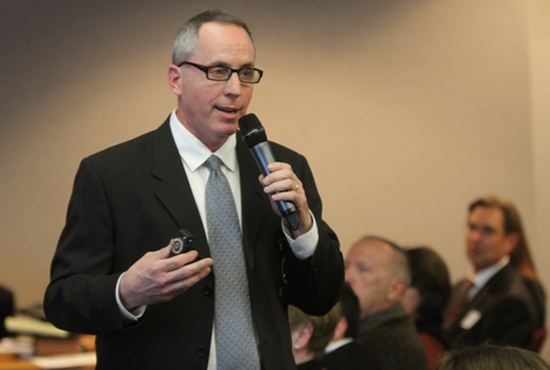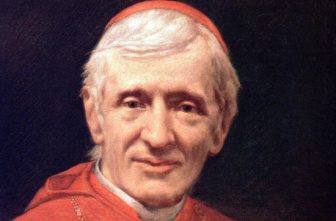
For nearly 150 people gathered at White Bear Lake City Hall Feb. 17, Ramsey County Attorney John Choi and St. Paul Police Sgt. Ray Gainey quashed the glamorization of prostitution as seen through Julia Roberts’ character in the 1990 film “Pretty Woman.” What they wanted to reveal instead was “one of the greatest human rights atrocities in our community” — sex trafficking, according to Choi.
Attendees of the discussion panel sponsored by St. Mary of the Lake’s social justice committee caught a glimpse of how victims often enter in this form of human trafficking and what it does to them. In a video clip, a high school aged girl described through tears how a sense of isolation led her to run away from home with a friend. But instead of encountering freedom, she was sexually exploited.
Choi and Gainey said combatting human trafficking is a top issue for law enforcement in the Twin Cities and greater Minnesota.
“These are kids from our own communities,” Sgt. Gainey said. “If you have runaways in your community, you have this problem.”
Attendees learned there have been recent cases of trafficking in White Bear Lake. Choi added that there are youth from the community in Ramsey County’s Runaway Intervention Project, which aims to reduce suicidal thoughts and self harm, including suicide attempts, among runaway youth. Sex trafficking can happen in any public place, and because of social media, anyone is reachable from anywhere.
Choi cited a U.S. Department of Justice statistic finding that 41 percent of human trafficking victims are younger than 18. More than half enter prostitution at age 13. A University of Minnesota study links poverty to sex trafficking.
Choi said part of addressing the problem has been for law enforcement to change the mindset from seeing people who have been trafficked as criminals to seeing them as people in need of help and protection.
“This is not how God intended them to be or how they started out,” he said.
Sgt. Gainey added that victims often don’t know there’s a way out.
Choi and Sgt. Gainey credited Minnesota’s 2011 Safe Harbor Law — which provides shelter and services for victims — with setting the framework for the state’s success in convicting the men and women who force girls into sex trafficking. In 2011, of the 38 sex trafficking cases statewide, there were seven convictions. In 2013, 72 sex trafficking cases produced 63 convictions.
“Victims can trust the system and tell their story,” Choi said.
Hemlal Kafle, who coordinates Catholic Charities’ services for human trafficking victims and is the labor committee chair on the Minnesota Human Trafficking Task Force, addressed the issue broadly in explaining how labor trafficking is as prominent as sex trafficking and takes many forms. Typically, victims work in service, hospitality and manufacturing industries, agriculture and construction.
Signs of human trafficking that should be reported
- A trafficked person:
- is not free to come and go
- is fearful, submissive, nervous
- avoids eye contact
- lacks health care and/or is malnourished
- shows signs on abuse, such as bruises or cuts
- has few possessions, no ID, no money
- does not know what day it is or where she or he is
Human Trafficking Hotline
1 (888) 373-7888
Raising awareness, supporting victims
In sponsoring the discussion panel, St. Mary of the Lake’s human trafficking committee wanted to make people aware of these crimes targeting vulnerable youth and adults so that they can help prevent them. Sara Walch, a parishioner and committee member, said human trafficking has been a major focus of the group since 2009. In addition to sponsoring awareness events, group members assemble care packages containing items that a survivor might need when she is rescued or escapes. The packages include a mini prayer shawl with a message.
“Having something tangible to hand with that supportive message is that much more powerful,” Walch said.
To distribute the care packages to victims, the committee has partnered with Catholic Charities and Civil Society, a Minnesota-based nonprofit that offers legal and social services to victims of trafficking, sexual assault and abuse. When Walch had an opportunity to share lunch with a survivor, she learned how valuable the care packages are.
“I could not believe her response,” Walch said. Of the packages, the survivor said, “I was naked. That was my world. That was everything I owned.”
Along with the care packages, school backpacks and Christmas gifts supplied by the parish brought $35,000 worth of tangible gifts to local victims of human trafficking in 2014, Walch said, adding that the parish’s ministry has grown in the last five years, and the community’s needs are growing.
“Two other service organizations would like care packages,” she said. “Often times, the service providers’ and law enforcement’s hands are tied. There are things they’re unable to provide victims.”
Walch pointed to a recently rescued trafficking victim who, because she didn’t have photo identification, wasn’t able to collect food, even from a food shelf, and she wasn’t yet eligible for benefits. The parish human trafficking committee learned of this and paid the $20 fee for the ID and supplied a $100 grocery gift card. The group once made the final payment on a victim’s car.
“Our dream is to have other churches, organizations and individuals adopt these programs and services so we can continue to meet these needs,” she said.
Father Ralph Talbot, pastor of St. Mary of the Lake, said he is pleased with the continual support of parishioners to aid this ministry and the turnout at the event, which he attended.
“I think it certainly brought the point home about the evil and the sadness and all those emotions around human trafficking,” he said.
White Bear Lake mayor and St. Mary of the Lake parishioner Jo Emerson said everyone needs to hear about the issue. “It’s in our midst, unfortunately,” she said.
Making progress
“What we consider the more important piece of the puzzle is trying to support legislation against human trafficking,” Walch said, adding that the committee filed an amicus brief against a website that Choi and Sgt. Gainey referenced as a hub for sex trafficking. The group also supports recommendations of Shared Hope International’s Protecting Innocence Challenge, which urges individual states to enhance legislation that helps victims.
Walch said that their group does most of its work through broadcast email, encouraging people to sign petitions, contact legislators and volunteer.
“It works beautifully,” she said. “We all act collectively on the issue, so there’s a lot of beauty and fellowship in that.”
While Choi and Sgt. Gainey laid out what the State of Minnesota has done to combat human trafficking, including extensive training for law enforcement, Catholics have recognized the need to heed the call of Church leaders from Pope Francis to the U.S. Conference of Catholic Bishops. The discussion panel came just more than a week after the first International Day of Prayer and Awareness Against Human Trafficking — which included a Mass Feb. 8 — designated by the Pontifical Council for Justice and Peace and the International Union of Superiors General.
Fundamentally, Choi said changing the culture will solve the problem of sex trafficking. “But we won’t change any of it until we have a community conversation about how we raise our boys,” he said, explaining that it’s about making sure men grow up to be loving and respectful.
Father Talbot, who served as an assistant state attorney in Miami before entering the seminary, said faith communities can help by giving parents better tools and equipping kids with skills and instilling confidence, giving them the “gift of courage through the Holy Spirit to say no.” Essentially, “forming sons and protecting daughters.”
“This is a bigger picture of the dignity of the human person,” he said. “We have to put this in the same category as working against abortion and assisted suicide.”
Father Talbot said that requires working with other faith communities and pushing pastors to raise those issues in homilies while being cognizant of the audience.
“It’s not easy,” he said. “Sometimes we have to walk away from Mass shaken and disturbed.”




